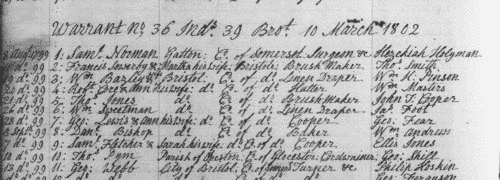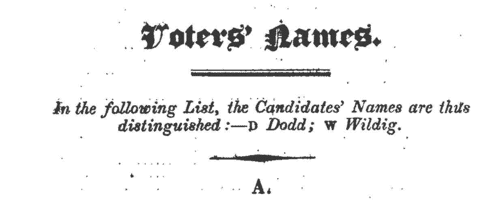Chesters Surname Ancestry ResultsOur indexes 1000-1999 include entries for the spelling 'chesters'. In the period you have requested, we have the following 62 records (displaying 1 to 10): Single Surname Subscription | | | Buying all 62 results of this search individually would cost £334.00. But you can have free access to all 62 records for a year, to view, to save and print, for £100. Save £234.00. More... |
These sample scans are from the original record. You will get scans of the full pages or articles where the surname you searched for has been found. Your web browser may prevent the sample windows from opening; in this case please change your browser settings to allow pop-up windows from this site. Lancashire and Cheshire Marriage Licences
(1624-1632)
Licences for intended marriages in Chester archdeaconry, which covered Cheshire and Lancashire south of the Ribble (by far the most populous part of that county)CHESTERS. Cost: £4.00.  | Sample scan, click to enlarge

|  Masters of apprentices registered in Cheshire
(1772) Masters of apprentices registered in Cheshire
(1772)
Apprenticeship indentures and clerks' articles were subject to a 6d or 12d per pound stamp duty: the registers of the payments usually give the master's trade, address, and occupation, and the apprentice's name, as well as details of the date and length of the apprenticeship. There are central registers for collections of the stamp duty in London, as well as returns from collectors in the provinces. These collectors generally received duty just from their own county, but sometimes from further afield. The indentures themselves can date from a year or two earlier than this return. (The sample entry shown on this scan is taken from a Bristol return. Each entry has two scans, the other being the facing page with the details of the indenture, length of service, and payment of duty.) IR 1/58CHESTERS. Cost: £8.00.  | Sample scan, click to enlarge

|  Apprentices registered in Staffordshire
(1774) Apprentices registered in Staffordshire
(1774)
Apprenticeship indentures and clerks' articles were subject to a 6d or 12d per pound stamp duty: the registers of the payments usually give the master's trade, address, and occupation, and the apprentice's name, as well as details of the date and length of the apprenticeship. There are central registers for collections of the stamp duty in London, as well as returns from collectors in the provinces. These collectors generally received duty just from their own county, but sometimes from further afield. The indentures themselves can date from a year or two earlier than this return. (The sample entry shown on this scan is taken from a Bristol return. Each entry has two scans, the other being the facing page with the details of the indenture, length of service, and payment of duty.) IR 1/59CHESTERS. Cost: £8.00.  | Sample scan, click to enlarge

|  Apprentices registered in Shropshire
(1796) Apprentices registered in Shropshire
(1796)
Apprenticeship indentures and clerks' articles were subject to a 6d or 12d per pound stamp duty: the registers of the payments usually give the master's trade, address, and occupation, and the apprentice's name, as well as details of the date and length of the apprenticeship. There are central registers for collections of the stamp duty in London, as well as returns from collectors in the provinces. These collectors generally received duty just from their own county, but sometimes from further afield. The indentures themselves can date from a year or two earlier than this return. (The sample entry shown on this scan is taken from a Bristol return. Each entry has two scans, the other being the facing page with the details of the indenture, length of service, and payment of duty.) IR 1/68CHESTERS. Cost: £8.00.  | Sample scan, click to enlarge

|  Apprentices registered in Shropshire
(1801) Apprentices registered in Shropshire
(1801)
Apprenticeship indentures and clerks' articles were subject to a 6d or 12d per pound stamp duty: the registers of the payments usually give the master's trade, address, and occupation, and the apprentice's name, as well as details of the date and length of the apprenticeship. There are central registers for collections of the stamp duty in London, as well as returns from collectors in the provinces. These collectors generally received duty just from their own county, but sometimes from further afield. The indentures themselves can date from a year or two earlier than this return. (The sample entry shown on this scan is taken from a Bristol return. Each entry has two scans, the other being the facing page with the details of the indenture, length of service, and payment of duty.) IR 1/70CHESTERS. Cost: £8.00.  | Sample scan, click to enlarge

| Tradesmen of Chester
(1392-1805)
Lists of admissions of freemen of the city of Chester from the earliest surviving records to 1805 were compiled by J. H. E. Bennett and published by the Lancashire and Cheshire Record Society from 1906. These lists were extracted from the mayoral yearbooks (dating back to 1392) and twelve freemen's rolls covering 1538 to 1612 and 1636 to 1805; and a list of admissions for 1505-1506 in Harleian MS 2105 (British Library). The record does not become more or less continuous until about 1490: in all, 12,426 freedoms are recorded. Freedom of the city, necessary to practise a trade in the city, could be obtained by birth (in which case the father's name and occupation are usually given); by apprenticeship to a freeman (the master's name and occupation being given); or by order of assembly. Both the freemen and the masters listed are indexed here. The main abbreviations used are: B, freedom taken up by right of birth; I, freedom taken up by right of indenture; M. B., Mayor's Book; *, freedom granted by order of assembly.CHESTERS. Cost: £4.00.  | Sample scan, click to enlarge

| Chester Freemen Voters
(1818)
Mr John Dodd (D) and Mr George Wildig (W) stood as candidates in 1818 for election by the freemen of the city of Chester as Sheriff of the People. The poll book lists all voters with full name (surname first), address, occupation, and a D or W according to their vote.CHESTERS. Cost: £4.00.  | Sample scan, click to enlarge

| Workers at Ewart's Cotton Mill, Manchester
(1818)
The minutes of evidence taken before the Lords Committee on the Cotton Factories Bill include a series of reports by medical men as to the general health of the mill workers in April 1818. For each factory there is a complete list of workers, giving full name, age, how long employed in a factory, health (in general terms, such as 'Good' or 'Sickly'), and any chronic disease or 'distortion', cause and duration - with slight variations from report to report. The physicians examined several hundred people each day, asking such questions as 'Have you any swellings or sores anywhere?', 'Are your limbs straight?', 'Have you a good appetite for food?', 'Do you conceive yourself to be in good health?', and all concluded that the health of the mill workers was good, and that the workers were cheerful. This is the report for Peter Ewart's cotton spinning factory in Manchester, 21 April 1818.CHESTERS. Cost: £6.00.  | Sample scan, click to enlarge

| Deaths, Marriages, Bankrupts, Dividends and Patents
(1819-1820)
Death notices and obituaries, marriage and birth notices, bankrupts and dividends, and patents, as reported in the Monthly Magazine or British Register. Includes some marriages and deaths from Ireland, Scotland and abroad.
CHESTERS. Cost: £6.00.  | Sample scan, click to enlarge

| Deaths, Marriages, Literary News, Bankrupts, Patents, and Dissolutions of Partnerships
(1822)
English death, marriage and birth notices, bankruptcies, certificates and dividends, dissolutions of partnerships, literary news, and patents, as reported in the European Magazine. Includes some marriages and deaths from Ireland, Scotland and abroad, and Scottish sequestrations (bankruptcies). January to June 1822.
CHESTERS. Cost: £6.00.  | Sample scan, click to enlarge

|
Research your ancestry, family history, genealogy and one-name study by direct access to original records and archives indexed by surname.
|













